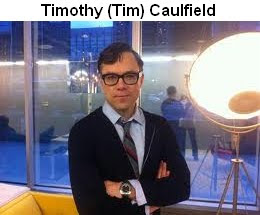Many scientists tried to set the record straight and they pretty much succeeded, at least in the scientific community. Most scientist now know that the case for junk DNA is a lot stronger than they thought.
Unfortunately, the criticisms didn't get much publicity and the average person is left with the impression that most of our genome has an important function, even if we don't know exactly what that function is. This means that good science writers have to work harder to educate the public about the true state of our genome.
Timothy Caulfield is a Professor in the Faculty of Law and the School of Public Health at the University of Alberta in Edmonton, Alberta, Canada. He's also Canada Research Chair in Health Law and Policy, a very prestigious award. He writes the following in today's issue of The Globe & Mail, Canada's most important newspaper [We’re overselling the health-care 'revolution' of personal genomics].
The relationship between our genome and disease is far more complicated than originally anticipated. Indeed, the more we learn about the human genome, the less we seem to know. For example, results from a major international initiative to explore all the elements of our genome (the ENCODE project) found that, despite decades-old conventional wisdom that much of our genome was nothing but “junk DNA,” as much as 80 per cent of our genome likely has some biological function. This work hints that things are much more convoluted than expected. So much so that one of ENCODE’s lead researchers, Yale’s Mark Gerstein, was quoted as saying that it’s “like opening a wire closet and seeing a hairball of wires.”Statements like this from someone who is supposed to be knowledgeable about such issues show us that the ENCODE fiasco has far-reaching consequences. The misleading statements by Ewan Birney and others will take years to undo. It's all the more reason to criticize Nature and Science for aiding and abetting the spread of this false information.
How can we expect people like Timothy Caulfield to understand the science if the leading journals get it wrong?
[Hat Tip: Ryan Gregory, "The Bullshit Continues to Spread" on Facebook.]








